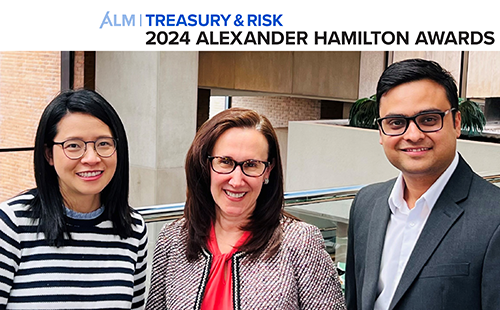
When international hospitality company NH Hotel Group developed an ambitious five-year plan for growth, it became clear that the treasury function would need an upgrade. Based in Madrid, the company operates around 350 hotels located mostly in city centers throughout 30 European and Latin American countries.
“Our headquarters are in Spain, but we had grown through acquisitions and ended up with a largely decentralized treasury model,” says Luis Martinez Jurado, senior vice president of treasury and finance for NH Hotel Group. “When the company embarked on our five-year plan, we had five treasury centers in Europe and four treasury centers in Latin America. Our local teams had a lot of autonomy. And we were using more than 1,500 bank accounts across a large number of banks.”
Cash flows were opaque to corporate treasury. “Each country was managing cash in its own way,” says Martinez. “They were collecting from their customers, paying their suppliers, their rents, their salaries. We tried to centralize excess cash, but the processes for doing so were rudimentary and manual.”
Local treasury teams handled their own liquidity forecasting and planning, as well. Once a month, they sent high-level projections to headquarters, but sometimes problems with the forecasts resulted in a cash deficit in a particular group. The business unit would borrow from the parent company through a process that was also highly manual: A treasury professional in the business unit would send a loan request. If a corporate treasury manager in Madrid approved the loan, the funds would be sent to the requesting group's bank account through a manual transfer.
 NH Hotel Group was already highly leveraged. Treasury managers knew that in order for the company to continue growing, it would have to gain a more consolidated view of both current and future cash flows. Thus, NH Hotel Group embarked on a treasury transformation process.
NH Hotel Group was already highly leveraged. Treasury managers knew that in order for the company to continue growing, it would have to gain a more consolidated view of both current and future cash flows. Thus, NH Hotel Group embarked on a treasury transformation process.
Communication was key, Martinez reports. The process lead in the transformation initiative traveled the world, meeting with local treasury and finance staff, as well as with local banks. “The first step was to make sure that everyone was speaking the same language,” he says. “For example, we needed to be sure that everybody was talking about the same thing when they were talking about issuing a 'manual' payment. For one person, it could be routing an electronic file through certain channels. For another, it might mean filling out a paper and faxing it to the bank. We established a common language so that we could build a common ground of processes and procedures.”
From there, the project team set out to rationalize the company's banking relationships. “We reduced the number of banks serving our European operations to four relationship banks, two of which serve as cash concentrators,” Martinez says. “Some of those also serve our banking needs in Latin America. We chose banks with good, bi-directional cash pooling platforms so that funds could flow seamlessly from the country to the parent company or vice versa.”
NH Hotel Group was transitioning to a new SAP enterprise resource planning (ERP) system, and the treasury group rolled out a treasury management system from Kyriba at the same time. They connected the Kyriba system to SAP and to all the company's bank accounts via SWIFTNet. Cash balance information flows automatically from the banks through Kyriba into SAP. “Now, every morning, we automatically receive a detailed cash position for all the cash balances at the group level,” Martinez says. “There is no bank account that is not reflected in that cash position—so we know every euro, every dollar, every Mexican peso that we have in the company.”
The treasury team also set up cash pooling wherever they could. “In Latin America, we cannot have a central cash pool because of tax restrictions and monetary controls,” Martinez says. “In those countries, when we have excess cash, the local teams manually transfer funds to the group-level in-house bank. In contrast, our cash pooling in Europe is highly automated. All our banks in Europe centralize excess cash at the country level, then these master accounts automatically sweep cash into a single European cash pool.”
Meanwhile, payments flow in the opposite direction. Corporate treasury works with accounts payable to generate a batch payment file in SAP. That file moves automatically into the treasury management system, where managers in the originating country provide their approvals. Then the Kyriba system produces a SWIFT file that is submitted to the banks, via SWIFTNet, for payment. “Everything is very simple,” Martinez says. “The authorized signatories can give their approvals through the app on their mobile phones and then the payment batch is automatically submitted. We have streamlined our processes in both directions.”
Business unit treasurers began uploading their cash flow forecasting into the system, as well. “There was a process of educating our local treasurers to improve their forecasting skills and homogenizing our forecasting processes,” Martinez says. “As a result of this effort, we now receive—every week—an updated, consolidated cash flow forecast for the coming days and months. We ended up with much more accurate cash projections for each country.”
The treasury center in Madrid handles all the transactional treasury for NH Hotel Group's European operations, which account for approximately 90 percent of the company's revenues. “The treasury center is the backbone of treasury operations,” Martinez says. “We also handle all corporate borrowing: We issue bonds. We have some international syndicated loans. The local teams can't raise a line of credit themselves; we have to be involved in all financing.”
See also:
- On-demand webcast: Revolutionizing Legacy Treasury Processes
- Big Changes to Capital Structure Drive Corporate Competitiveness
- When Radical Process Changes Pay Off
- A Revamped Infrastructure for Intercompany Payments
Together, these changes have helped NH Hotel Group dramatically improve working capital management. “Today, we have a lot of visibility on our cash and our projections,” Martinez says. “This allows us to be much more efficient and accurate in our planning. We know when we have to pay, we know when we'll have the cash, and we know how much we need to transfer to fund each bank account. The improved accuracy in our forecasting allows us to make better decisions around liability management. For example, at the end of last year, we decided to exercise an early redemption of one of our bonds, worth 40 million euros, because our new forecasting visibility let us see that those funds were pure excess cash we didn't actually need.
“We have made a lot of changes, both inside and outside treasury,” he adds. “All these changes have allowed us to reduce our average collection period from around 36 days in 2015 to less than 15 days now. We have increased our EBITDA through some of the changes to our business, and our treasury transformation initiative has enabled us to convert that EBITDA into cash that has been key in the deleveraging of NH.”
“As another outcome of all these changes, corporate treasury today is assuming a new role within the NH organization,” explains Fernando Cebada, vice president of corporate treasury for NH Hotel Group. “The treasury function has evolved from a purely transactional approach to become a real business partner to the rest of the company, raising and developing front-line value-added projects that contribute to improving the customer experience through state-of-the-art technologies, platforms, and methods of payment. The financial environment nowadays is subject to constant evolution, which is creating great opportunities, and we are ready to be there leading the transformation.”
© 2025 ALM Global, LLC, All Rights Reserved. Request academic re-use from www.copyright.com. All other uses, submit a request to [email protected]. For more information visit Asset & Logo Licensing.




